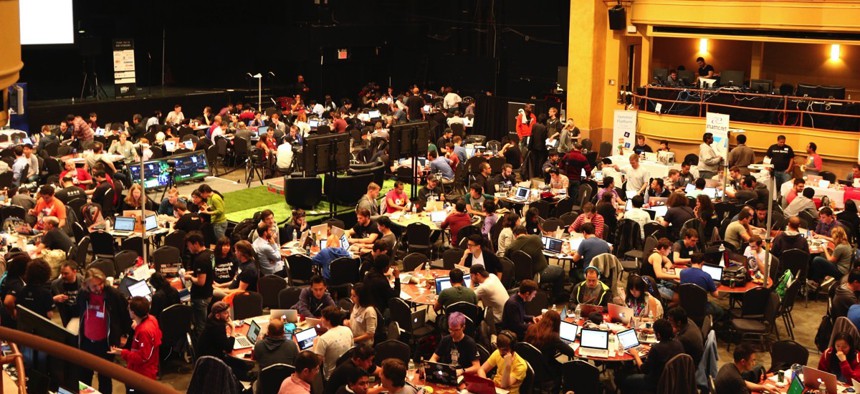What Particular Civic Tech Hackathons Reflect About a City’s Challenges

TechCrunch Hackathon at Disrupt NY 2015 TechCrunch / Flickr.com
Los Angeles is worried about water while in Texas, the Rio Grande Valley wants to get underserved voters to the polls.
Saturday is National Day of Civic Hacking, and you can tell a lot about local government priorities based on where cities hold their hackathons.
Take Hack for LA for instance: The largest civic hacking organization in Southern California, which is being held for two days at the city’s Department of Water and Power.
With California in the midst of a four-year severe drought, Gov. Jerry Brown declared a state of emergency in January and ordered a statewide 25-percent reduction in water use—prompting Angelenos to focus their hackathon on water conservation.
“Hack for LA is a great example of how we can harness technology and our city's creativity to solve everyday problems,” Mayor Eric Garcetti said in a statement. “As Mayor, I will closely partner with our tech industry to create jobs and bring innovation to City Hall so government works faster and more efficiently.”
Ongoing Save the Drop trainings will provide everyday, easy-to-implement water conservation advice, in addition to innovation workshops and solution-development for drought, health, transportation and immigration issues.
All participating urbanists, civic hackers, government staffers, developers and other interested citizens need are their laptops, with $3,500 available in cash prizes for winning ideas leveraging local open data sources.
Garcetti’s #DroughtHack initiative having taken on a life of its own, the 48-hour Saving Water Futurethon will be held in conjunction with the hackathon:
Introducing Saving Water, a 48-hour Futurethon designed to kickstart sustainable and long-lasting solutions to California’s water problem. The winning team’s solution could be messaging, strategy, products, campaigns, utilities, art, or technology, as long as it takes an innovative and aggressive approach to solving the drought. After all, a problem of this magnitude requires a whole community of cooperation to find a solution.
Professionals and students will team up based on their skillsets to solve one of three challenges: reducing landscaping water usage; reclaiming water through recycling and other practices; and reminding residents about their water consumption.
One of three winning groups will get a summer fellowship at the University of Southern California to implement their idea by 2015.
Then there’s Code for Miami being held at The Lab Miami, billed as “a campus for creative entrepreneurs,” in the city’s Wynwood neighborhood, known for its Arts District.
The state of Florida’s chief financial officer, Jeff Atwater, will be on hand for the first Commercial Finance Association Florida statewide challenge to make vendor payment data more “digestible” as an interactive infographic for citizens.
Other project themes include climate change and the threat rising sea levels pose to South Florida, disaster preparation and relief, open data and transportation around the Miami area.
Another of the more than 100 hackathons happening nationally is Code#RGV in the growing Rio Grande Valley community in Texas.
Sponsored by Code RGV, a nonprofit teaching and certifying the valley’s underserved programming and technology skills, and located in the McAllen Creative Incubator, several projects are aimed at solving local problems.
They include: Improving voter turnout in the valley by mobilizing them and clarifying the process; spreading awareness about the local International Museum of Art & Science; mapping and visualizing city data; and educating citizens on recyclables.
(Photo by TechCrunch / Flickr.com)
NEXT STORY: More efficient traffic stops… for police






